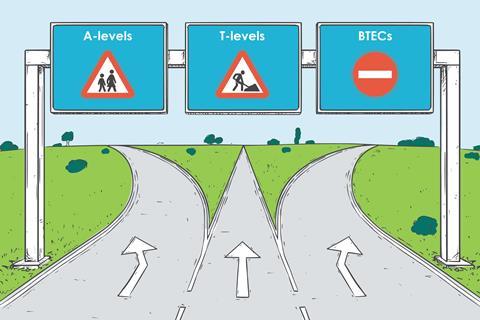Experts weigh in on how changes in government funding will affect technical qualifications offered in science

There’s a shake-up taking place in post-16 education. The government says it wants to simplify the qualifications landscape for 16–19 year-olds to reduce the complexity, overlap and variable quality of current offerings.
Alongside apprenticeships, the plan is to have technical T-levels and academic A-levels as the main qualification options in England. These will provide ‘a ladder of opportunity for young people from all backgrounds, so every qualification leads to a rewarding career, either through higher education or skilled work,’ says a spokesperson for the Department for Education (DfE).
Narrowing options
Qualifications that overlap with T-levels and most small vocational qualifications – equivalent to one A-level – are expected to lose funding. From 2025, there will be no two to three A-level equivalent alternatives in health or science. These will mostly be BTECs and Cambridge Technicals. The DfE says students who take A-levels have better continuation rates and progression than students who take BTECs (although these have recently been reformed to make them more rigorous).
Some simplification of qualification options is welcomed, but a range of voices in education have cautioned against defunding BTECs until T-levels are properly established. There’s also concern that a binary split between technical and academic routes will narrow student options.
The BTEC is focused on more assignment-based assessment, which is much more reflective of how people work in the real world
Katie Dryden-Holt, who leads the vocational skills programme at the Royal Society of Chemistry, explains that T-levels don’t do the job of BTECs. ‘There’s a great range of different units available, so employers (in the case of apprenticeships) or learners can tailor the programme.’ In contrast, the content of T-levels is mandatory once a specialism – food science, lab science or metrology – is selected. Specialisms imply making career choices much earlier, and a narrowing of knowledge, whereas a 3 A-level equivalent BTEC would cover all three sciences and other topics, such as forensics or medical physics.
Different student cohorts
Assessment differs too, says Katie. ‘If you are a learner who does not do well with exam-based assessment [and] you have to choose between A-levels and T-levels, you’re kind of between a rock and a hard place. Whereas the BTEC is focused on more assignment-based assessment, which is much more reflective of how people work in the real world.’
Amy Brewer, a science subject advisor at OCR who has taught A-levels and vocational qualifications, says schools will have to think about how they structure courses because the cohort of students will be different and students prepare in a different way for A-levels, A-levels with an Alternative Academic Qualification (AAQ) and T-levels. T-level entry requirements are also tougher than for BTECs, where programmes would have accommodated students repeating English or maths GCSEs.
Students who did not want to study A-levels could be ‘doubly disadvantaged’ if the work placement element of T-levels is unavailable or not of high quality
The government’s own analysis shows that a wide range of students, including those from disadvantaged backgrounds or with special educational needs, are likely to be impacted by reforms. But it argues that students will be in a stronger position to progress into employment or higher education. However, college leaders told MPs on the Education Select Committee that students who did not want to study A-levels could be ‘doubly disadvantaged’ if the work placement element of T-levels is unavailable or not of high quality. And in a letter to the education secretary, they warn the government has failed to develop a ‘coherent implementation plan’. They want BTECs to remain as a back-up while problems are ironed out, as in last year’s T-level health and science paper where the exam differed from the curriculum material.
The Select Committee has now called on government to withdraw BTECs only when there is ‘robust evidence’ that T-levels are ‘effective in preparing students for progression, meeting industry needs and promoting social mobility’.
Diversity in the talent pipeline
One area of concern is forensic science, which currently has a BTEC option but no T-level alternative. Becky Thorn, product manager for science and sustainability at Pearson, suggests that only offering forensic science through A-levels could disproportionally impact some groups of students. ‘It could affect the talent pipeline [in volume terms] because you’re having fewer routes into forensic science but, alongside that, there is also an issue in the makeup of forensic scientists that are going into the workforce that I think is a concern.’
Providers can develop some smaller qualifications to sit alongside A-levels, such as the AAQs, but Becky says there won’t be space in an AAQ to teach a full forensic science course. Interestingly, students will be permitted to take only one AAQ alongside A-levels, and they can’t take them alongside T-levels.
Both Pearson and OCR are working on new AAQs in health and science. The UK government will make decisions on which AAQs will be funded in 2024. Pearson is developing AAQs in applied science, medical science and sustainability. In applied science, OCR is working on an AAQ with optional units in analytical techniques in chemistry, environmental science, forensic biology and medical physics. ‘We’ve really focused on the skills that universities have said they’d like to see, not just in the core sciences but in allied and applied sciences as well, to support students to be successful,’ says Amy.
Every year, approximately 25,000 students achieve BTEC or Cambridge Technicals in applied science. The big question is whether axing them will keep those students in science or risk losing them to other sectors.
Find out more
Explore different qualifications and routes you can take to become a professional chemical scientist and have a successful career in chemistry with our study options article.














No comments yet